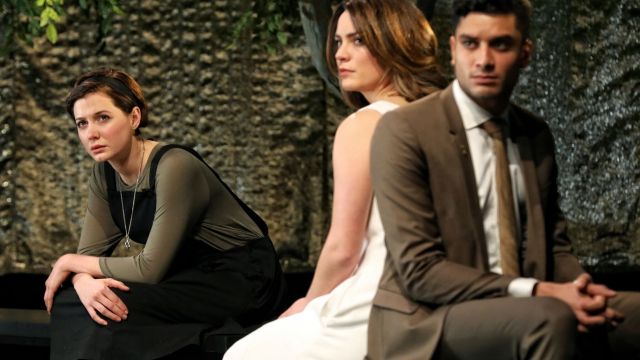The Merchant of Venice
Anne-Louise Sarks gives us a powerful and disturbing interpretation of Shakespeare’s play. It has energy, clarity and a finely judged juxtaposition of the bright and the dark. The entire cast seems to understand what they’re saying (not always the case with the Bard) and speak the lines as if they have just thought of them, but they also find fresh nuance, meaning and comedy in their characters. The Merchant is described sometimes as a ‘romantic comedy’, which just happens to include the portrait of a ‘vengeful Jew’. This production alters that emphasis. While the romances and comic game-playing of Portia (Jessica Tovey) and Bassanio (Damien Strouthos), and Nerissa (Catherine Davies) and Gratiano (Fayssal Bazzi) are there, they are thrown into a different kind of relief and our perceptions of them are questioned.
Like this year’s earlier Richard III, this production has only one set. Michael Hankin’s design, enhanced by Paul Jackson’s subtle lighting, features a wall of gold – very much to the point here – a single tree and benches making an enclosing curve upstage. At the start, autumnal golden leaves fall from above. At the end, the leaves are grey. The actors never leave the stage. Even costume changes are done in plain view. When any character is not in a scene, they wait or, as it were, observe. Thus visually, lives and actions are bound together.
 Some people may think of the character of Shylock (Mitchel Butel) as the merchant of the title. He’s not. The merchant is Antonio (Jo Turner), a Christian in a financial hole to whom Shylock lends money. Shylock is not a merchant; he is a Jew. In 16th century Venice, a Jew is not permitted to be a merchant or, indeed much else. So he is a money-lender who charges interest – thus a usurer – and thus a sinner – albeit necessary - in the eyes of Christians. He is confined to the ghetto, subject to exclusion, restrictions, curfew, contempt and abuse – the last, indeed, at the hands of the merchant Antonio. Shylock catalogues these abuses, which include being spat on and called a ‘dog’. If he is ‘vengeful’ it is hard to resist the thought that he has good cause. In a sense, he is what these Christians have made him. But Mr Butel’s Shylock does not whine. It is a performance that rivets one’s attention. His Shylock is matter-of-fact, a proud and dignified figure – albeit with an impotent fury underlying every word. He openly declares that he hates Antonio. And yet, his delivery of the famous ‘if you prick us, do we not bleed’ speech is heartfelt, exposing a vulnerability that deepens our sense of his fate. The chilly, measured dignity drops for a moment as he almost but not quite pleads with the audience. What he suffers is patently cruel and unjust and unwarranted. When Antonio comes to him for the money he needs – even then maintaining his anti-Semitic sneering contempt – Shylock sees an opportunity for that vengeance long denied.
Some people may think of the character of Shylock (Mitchel Butel) as the merchant of the title. He’s not. The merchant is Antonio (Jo Turner), a Christian in a financial hole to whom Shylock lends money. Shylock is not a merchant; he is a Jew. In 16th century Venice, a Jew is not permitted to be a merchant or, indeed much else. So he is a money-lender who charges interest – thus a usurer – and thus a sinner – albeit necessary - in the eyes of Christians. He is confined to the ghetto, subject to exclusion, restrictions, curfew, contempt and abuse – the last, indeed, at the hands of the merchant Antonio. Shylock catalogues these abuses, which include being spat on and called a ‘dog’. If he is ‘vengeful’ it is hard to resist the thought that he has good cause. In a sense, he is what these Christians have made him. But Mr Butel’s Shylock does not whine. It is a performance that rivets one’s attention. His Shylock is matter-of-fact, a proud and dignified figure – albeit with an impotent fury underlying every word. He openly declares that he hates Antonio. And yet, his delivery of the famous ‘if you prick us, do we not bleed’ speech is heartfelt, exposing a vulnerability that deepens our sense of his fate. The chilly, measured dignity drops for a moment as he almost but not quite pleads with the audience. What he suffers is patently cruel and unjust and unwarranted. When Antonio comes to him for the money he needs – even then maintaining his anti-Semitic sneering contempt – Shylock sees an opportunity for that vengeance long denied.
But all is not sombre. The comedy is deliciously done. The scenes of Portia’s suitors choosing the wrong caskets – first, the impossibly vain popinjay Prince of Morocco (Shiv Palekar), then the pompous, condescending Duke of Arragon (Eugene Gilfedder) – are interludes of sharp satire on foolish, inflated men. Jacob Warner as Launcelot, first Shylock’s servant and then Bassanio’s, milks new laughter out of this try-hard, preening but ever-disappointed dimwit – but with an edge of sadness to his hopeless infatuation with Shylock’s daughter, Jessica (Felicity McKay). Mr Warner is a natural clown, his timing impeccable and he never misses an opportunity to insert an extra bit of comic business into any action. Ms Tovey, as Portia, plays up the giddy girlish side of the character, hastily pulling her shoes on when a suitor arrives, then po-faced as she explains the ‘rules’ of the caskets – and falling into giggling, delighted relief when the suitors fail. Until, of course, Bassanio has his go. Whether this characterisation is a plausible preparation for the solemn, quick lawyer Portia must pretend to be later is risky, but here it works because the Portia we know is only just hidden in the pretence – which she visibly enjoys. Ms Davies’ Nerissa, Portia’s handmaiden but also BFF, is a great foil and pretty sparky herself – although what she sees in the oafish Gratiano does strain credibility.
 The merchant himself, Antonio, is different from the other men: he is older and his wardrobe somewhat dandy-ish. There is a hint of pathos that feeds nicely into his vile anti-Semitism. Ms Sarks and Mr Turner do not shy away from a gay Antonio’s unadmitted love for his friend Bassanio – of which Bassanio is oblivious. But why else has Antonio repeatedly lent feckless Bassanio so much money? It is a tribute to this cast’s abilities that the ‘romantic’ elements work as well as they do since these Venetian young fellows are recognisably ‘modern’ in the sense of bursting with loud, undirected energy, clunky boysy humour, automatic, blinkered prejudice and easily provoked thuggery. Judicious and ethnically diverse casting – that is, in the look of these actors – adds credibility.
The merchant himself, Antonio, is different from the other men: he is older and his wardrobe somewhat dandy-ish. There is a hint of pathos that feeds nicely into his vile anti-Semitism. Ms Sarks and Mr Turner do not shy away from a gay Antonio’s unadmitted love for his friend Bassanio – of which Bassanio is oblivious. But why else has Antonio repeatedly lent feckless Bassanio so much money? It is a tribute to this cast’s abilities that the ‘romantic’ elements work as well as they do since these Venetian young fellows are recognisably ‘modern’ in the sense of bursting with loud, undirected energy, clunky boysy humour, automatic, blinkered prejudice and easily provoked thuggery. Judicious and ethnically diverse casting – that is, in the look of these actors – adds credibility.
When Portia, at the last moment, prevents Shylock from cutting his forfeit from Antonio’s breast and traps him within Venetian law, the triumphalism of Antonio’s mates, their crowing jeering and physical violence at Shylock’s destruction and impoverishment is frightening. Mr Butel turns white, as it were, with dismay. Shylock’s enforced ‘conversion’ to Christianity occurs right there on stage. He is held and stripped of his tallit katan (the tzitzit undergarment), then his shirt, his yarmulke pulled off and a crucifix hung around his neck. Yes, he was – or was he? – about to plunge a knife into Antonio’s breast – so they have an excuse - but this scene develops into something shocking and awful, reminiscent of nothing so much as Nazi thugs beating up a lone Jew on the street. (Or perhaps those ‘brave’ patriots who abuse and assault Muslim women here?)
 After this scene, it must be said there is a slightly sour taste to the comic folderol about the rings – especially so since, in keeping with the mode of the whole production, Shylock is still on stage, sitting on the edge of the space, bowed with grief and humiliation, his hand covering where his yarmulke should be. As a final note, his daughter Jessica who ‘for love’ has abandoned her father and slipped happily into Christianity, weeps with shame.
After this scene, it must be said there is a slightly sour taste to the comic folderol about the rings – especially so since, in keeping with the mode of the whole production, Shylock is still on stage, sitting on the edge of the space, bowed with grief and humiliation, his hand covering where his yarmulke should be. As a final note, his daughter Jessica who ‘for love’ has abandoned her father and slipped happily into Christianity, weeps with shame.
This is a highly intelligent – and valid – interpretation of the text. It does not soften Shakespeare’s habit of including cruel humiliation – even of characters who ‘deserve’ it - and thus it pushes unreservedly his characteristic ambivalence about his characters, the mix of good and bad, the admirable and the shameful and the ridiculous that is us human beings.
Michael Brindley
Photographer: Prudence Upton
Subscribe to our E-Newsletter, buy our latest print edition or find a Performing Arts book at Book Nook.

